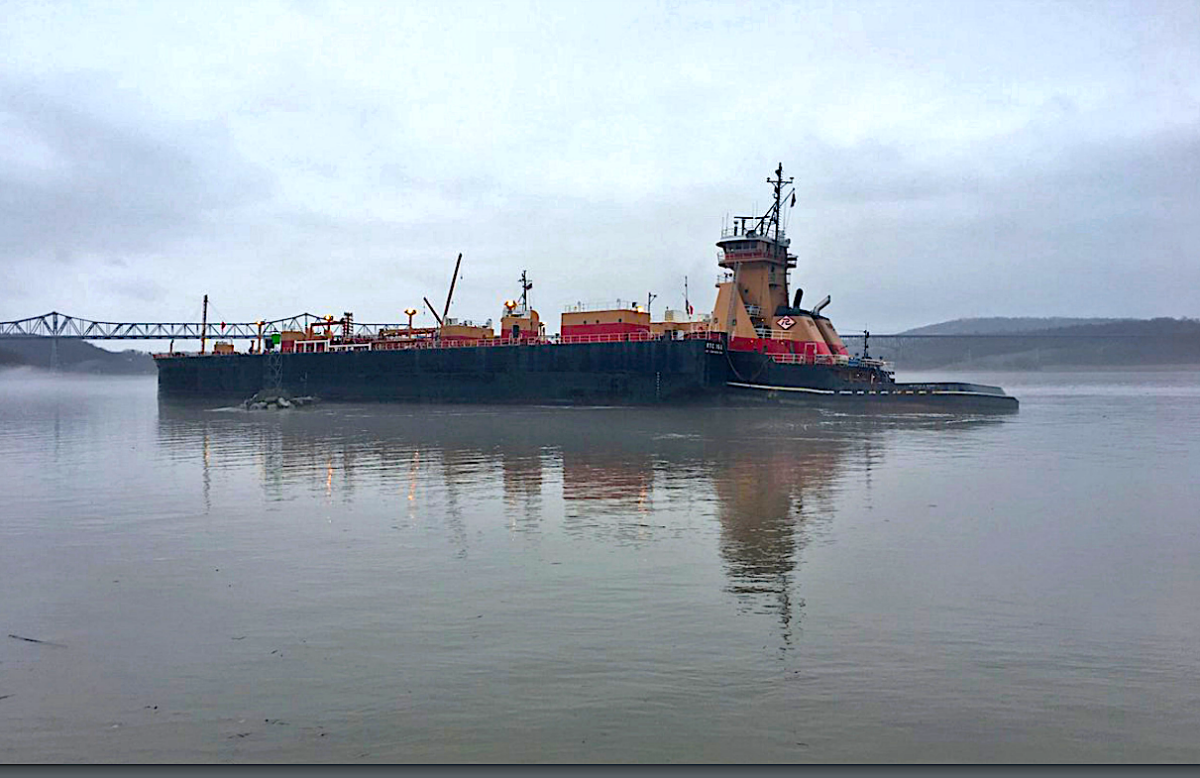Public officials and members of environmental groups are among those who are lashing out at the U.S. Coast Guard for reenergizing a controversy that it had been thought was previously resolved. The controversy concerns the parking of barges along the Hudson River north of the Mario M. Cuomo Bridge. The Coast Guard has revisited rulings made in the past and come up with a new interpretation that would allow an unlimited number of barges containing hazardous materials such as oil and asphalt to be parked along the river.
The Coast Guard reinterpreted the boundaries of the Port of New York, which used to include the Hudson River from New York City all the way up to Albany. Now the Coast Guard says that the Port of New York only includes the waters from the Statue of Liberty to the Cuomo Bridge. Since the rest of the Hudson according to the Coast Guard is now outside of the Port of New York limitations are off and the rest of the river can be used more intensely as a parking lot for barges.

New York State Senator Pete Harckham and Assemblymember Dana Levenberg complained in a Nov. 3 letter to the Coast Guard that not only was the Coast Guard wrong when it reinterpreted the boundaries for the Port of New York, it acted illegally.
“Section 8437 of the Elijah E. Cummings Coast Guard Authorization Act of 2020 suspended the establishment of new anchorage grounds between Yonkers, NY, and Kingston, NY,” Harckham and Levenberg wrote to Coast Guard New York Sector Commander Michelle Villafane. “As such, the Coast Guard currently lacks the authority to establish new anchorages in this region. Notwithstanding the Elijah E. Cummings Act, the Coast Guard adopted a policy that effectively establishes an unlimited number of new anchoring locations.”
Harckham and Levenberg charged the Coast Guard with going ahead with the anchoring plan without any opportunity for public comment or environmental review. They characterized that as “entirely undemocratic and bad public policy.”
Harckham later said, “This ridiculous idea needs to be stopped once and for all, and I will do everything I can to make sure it does not come to pass. The Hudson River’s economic and environmental value to this region — its residents and business owners — cannot be put at risk from such short-sighted and inchoate decision-making.”
In 2016 and 2018, the Coast Guard tried to move ahead with similar plans to allow barge anchoring on the Hudson River up to Albany, but the plans were killed by strong opposition from lawmakers and environmentalists. In October 2017, then Gov. Andrew Cuomo signed into law legislation that increased the state’s oversight of oil barges on the Hudson. It had been proposed as a countermeasure to the tug and barge industry seeking 43 new berths at 10 anchorage grounds from Yonkers to Kingston.
The organization Riverkeeper recalled that in 2016 communities throughout the Hudson Valley came together to oppose that maritime industry request to expand the designated areas in the Hudson River where commercial vessels would be allowed to anchor. Riverkeeper and the public wanted strict limits on where and for how long commercial vessels are allowed to anchor in the Hudson. At the time, the tug and barge industry was looking forward to an increase in crude oil shipments from the Midwest. The Coast Guard received 10,212 comments about its plan, most opposed to the idea.
“The expansion of anchoring will have negative consequences on the environment, public health and economic development in the surrounding area,” Riverkeeper said about the most recent Coast Guard decision. “Many of the communities we represent with Hudson River waterfronts have made generational investments in improving the Hudson River and remaking the waterfront as an inviting destination for residents and visitors to enjoy for recreation and local businesses.”
Riverkeeper also alleges that the Coast Guard acted illegally because it did not do appropriate environmental reviews before redefining the boundaries of the Port of New York.
Congressman Pat Ryan, who formerly served as Ulster County Executive, has expressed his concerns about the Coast Guard’s plan to open up the Hudson for barge parking.
“Just a few years ago, a coalition led by local community leaders and nonprofits like Riverkeeper and Scenic Hudson banded together to protect our river from big corporations who were putting their profits ahead of our health and safety,” Ryan said. “I’m calling on our community to once again stand together and fight for our river. We’ve worked too hard for too long to let oil monopolies erase our progress just so they can make even more money. It’s up to all of us to protect our kids, our drinking water, and our entire ecosystem.”
Another group known as Hudson 7 has a special interest in protecting the river. Its more formal name is the Hudson River Drinking Water Intermunicipal Council and it’s composed of members from seven municipalities that draw drinking water from the Hudson. The communities are the Town of Hyde Park, Town of Esopus, Town of Lloyd, Torn and Village of Rhinebeck and the Town and City of Poughkeepsie. They’re concerned that hazardous materials could enter the water from a barge or a barge being parked could hit a water intake pipe.




















